Comprehensive Guide to Garden Maintenance in Poplar
Introduction to Garden Maintenance
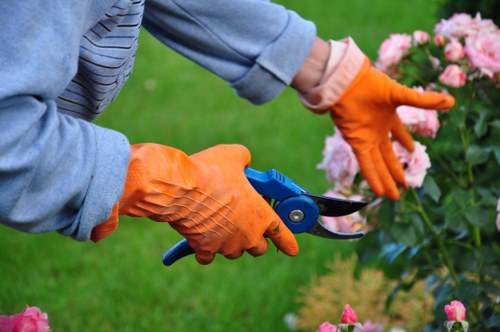
Maintaining a beautiful garden in Poplar requires dedication, knowledge, and the right set of tools. Whether you're a seasoned gardener or a beginner, understanding the unique climate and soil conditions of Poplar is essential for successful garden upkeep.
Garden maintenance encompasses a variety of tasks, including planting, pruning, weeding, and pest control. Each of these activities plays a crucial role in ensuring your garden remains vibrant and healthy throughout the year.
In this guide, we'll explore the best practices for garden maintenance in Poplar, offering tips and strategies to help you create and sustain a flourishing outdoor space.
Understanding Poplar's Climate and Soil
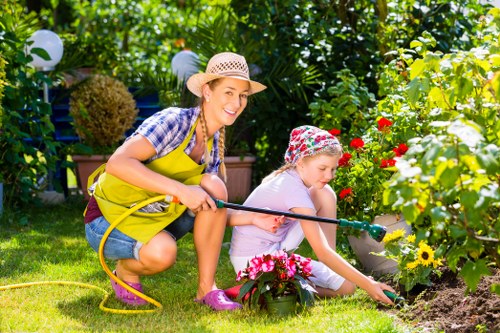
Poplar experiences a temperate climate with distinct seasons, which greatly influences garden maintenance routines. Summers can be warm and humid, while winters are cold with occasional snowfall.
The soil in Poplar tends to be a mix of clay and loam, providing a fertile ground for various plants. However, it's important to regularly test your soil to determine its pH level and nutrient content, ensuring optimal conditions for your garden.
By tailoring your maintenance practices to the local climate and soil characteristics, you can enhance plant growth and minimize common gardening challenges.
Essential Garden Maintenance Tasks
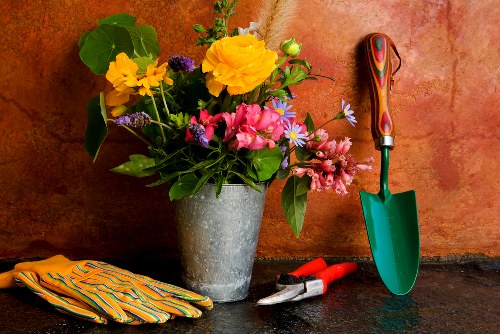
Effective garden maintenance involves several key tasks that, when performed regularly, keep your garden in excellent condition.
Pruning and Trimming
Regular pruning helps maintain the shape of your plants, encourages healthy growth, and prevents diseases. Trim dead or overgrown branches to allow more sunlight and air circulation.
Weeding
Removing weeds is crucial as they compete with your plants for nutrients and water. Hand-pulling weeds or using organic mulches can significantly reduce weed growth.
Pest Control
Identify and manage pests early to prevent infestations. Use eco-friendly pesticides or natural predators to maintain a balanced ecosystem in your garden.
Seasonal Maintenance Tips
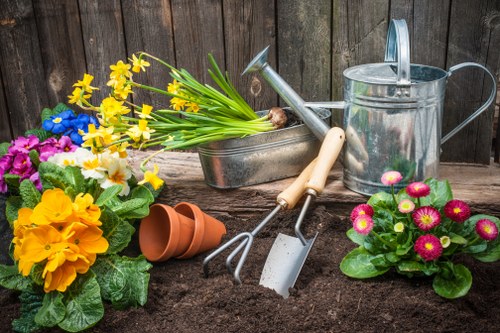
Adapting your garden maintenance practices to the changing seasons ensures year-round plant health and beauty.
Spring
Spring is the perfect time to prepare your garden for the growing season. Start by cleaning up debris, planting new flowers, and applying fertilizers to nourish your plants.
Summer
During the hot months, focus on regular watering, mulching to retain moisture, and protecting plants from pests and extreme heat.
Autumn
As temperatures drop, it's essential to clear fallen leaves, prune perennials, and prepare your garden beds for winter. This helps prevent diseases and sets the stage for a robust spring growth.
Winter
In winter, focus on maintaining garden tools, protecting sensitive plants with coverings, and planning for the next gardening season.
Choosing the Right Plants for Poplar Gardens
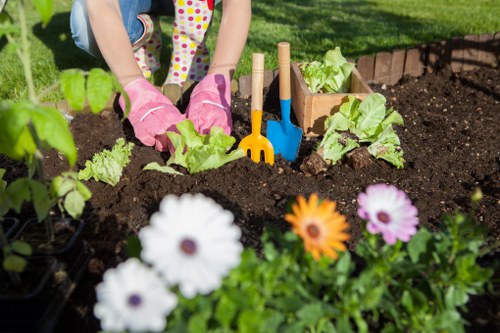
Selecting plants that thrive in Poplar's climate is fundamental to successful garden maintenance. Native plants are often the best choice as they are adapted to the local environment and require less maintenance.
- Perennials: Plants that come back year after year, such as Hostas and Daylilies.
- Annuals: Seasonal plants like Marigolds and Petunias add vibrant color.
- Shrubs and Trees: Proper selection can provide structure and shade to your garden.
Incorporating a mix of these plant types can create a balanced and aesthetically pleasing garden that requires minimal upkeep.
Tools and Equipment for Efficient Garden Maintenance
Having the right tools can make garden maintenance tasks easier and more efficient. Invest in quality gardening tools that are durable and suited to your specific needs.
- Pruning Shears: Essential for trimming plants and maintaining shape.
- Garden Fork: Useful for turning soil and removing weeds.
- Watering Can or Hose: Ensures your plants receive adequate moisture.
- Gloves: Protect your hands while working.
- Lawn Mower: Keeps your grass neat and healthy.
Proper maintenance of your tools, including regular cleaning and sharpening, extends their lifespan and ensures they perform effectively.
Organic Gardening Practices
Embracing organic gardening methods not only benefits the environment but also promotes healthier plants. Organic practices reduce reliance on synthetic chemicals, enhancing biodiversity and soil health.
Composting
Creating compost from kitchen scraps and garden waste provides a rich, natural fertilizer for your plants. Compost improves soil structure and nutrient content, fostering robust plant growth.
Natural Pest Control
Encourage beneficial insects like ladybugs and butterflies that naturally control pests. Additionally, using barriers and traps can help manage unwanted invaders without harming the ecosystem.
Mulching
Applying organic mulches, such as straw or wood chips, helps retain soil moisture, suppress weeds, and regulate soil temperature.
Water Management in Poplar Gardens
Effective water management is crucial for maintaining a healthy garden in Poplar. Both overwatering and underwatering can lead to plant stress and disease.
Efficient Irrigation Systems
Invest in irrigation systems like drip hoses or soaker lines that deliver water directly to the plant roots, minimizing evaporation and waste.
Rainwater Harvesting
Collecting rainwater is an eco-friendly way to provide natural hydration for your garden. Install rain barrels to capture and store water during rainy periods.
Water Conservation Tips
Implement mulch to retain soil moisture, choose drought-resistant plants, and schedule watering during the early morning or late evening to reduce evaporation.
Maintaining Garden Health
Regular monitoring and proactive care are key to sustaining a healthy garden. Keep an eye out for signs of stress, disease, or pest infestations.
Soil Health
Healthy soil is the foundation of a thriving garden. Regularly amend your soil with organic matter and avoid compaction to promote strong root growth.
Plant Nutrition
Ensure your plants receive the necessary nutrients through balanced fertilization. Conduct soil tests to determine specific needs and apply fertilizers accordingly.
Disease Prevention
Rotate crops, maintain proper spacing, and remove diseased plant material promptly to prevent the spread of infections.
Landscaping Ideas for Poplar Gardens
Enhance the visual appeal of your garden with thoughtful landscaping. Incorporate elements like pathways, water features, and seating areas to create a welcoming outdoor space.
- Pathways: Use gravel, stone, or brick to create inviting trails through your garden.
- Water Features: Install fountains or ponds to add tranquility and attract wildlife.
- Seating Areas: Comfortable benches or patio sets offer a place to relax and enjoy your garden.
Creative landscaping not only beautifies your garden but also increases its functionality and enjoyment.
Hiring Professional Garden Maintenance Services
While DIY garden maintenance is rewarding, sometimes hiring professionals ensures tasks are done efficiently and expertly. Professional gardeners in Poplar offer a range of services tailored to your garden's needs.
Benefits of hiring professionals include:
- Expertise in local plant species and climate conditions.
- Access to specialized tools and equipment.
- Time-saving, allowing you to enjoy your garden without the hassle.
- Customized maintenance plans to meet your specific requirements.
Consider reaching out to local garden maintenance companies to discuss how they can help your garden thrive.
Conclusion
Effective garden maintenance in Poplar involves a combination of understanding the local environment, performing essential upkeep tasks, and making informed decisions about plant selection and care.
By following the strategies outlined in this guide, you can create a lush, vibrant garden that not only enhances your property's beauty but also provides a peaceful retreat for you and your family.
Don't wait to transform your outdoor space—contact us today to start your journey towards a stunning garden in Poplar.
Additional Tips for a Thriving Garden
Here are some extra tips to ensure your garden remains healthy and beautiful throughout the year:
- Regularly inspect plants: Early detection of issues allows for prompt intervention.
- Rotate crops: Prevent soil depletion and reduce pest buildup by changing plant locations each season.
- Use companion planting: Certain plants grow better together, enhancing growth and deterring pests.
- Maintain garden hygiene: Keep tools clean and store them properly to avoid spreading diseases.
- Stay informed: Keep up with gardening trends and local advisories to stay ahead of potential challenges.
Implementing these practices will contribute to a sustainable and flourishing garden in Poplar.
Ready to elevate your garden's beauty? Book your service now and let our experts help you achieve the garden of your dreams.
